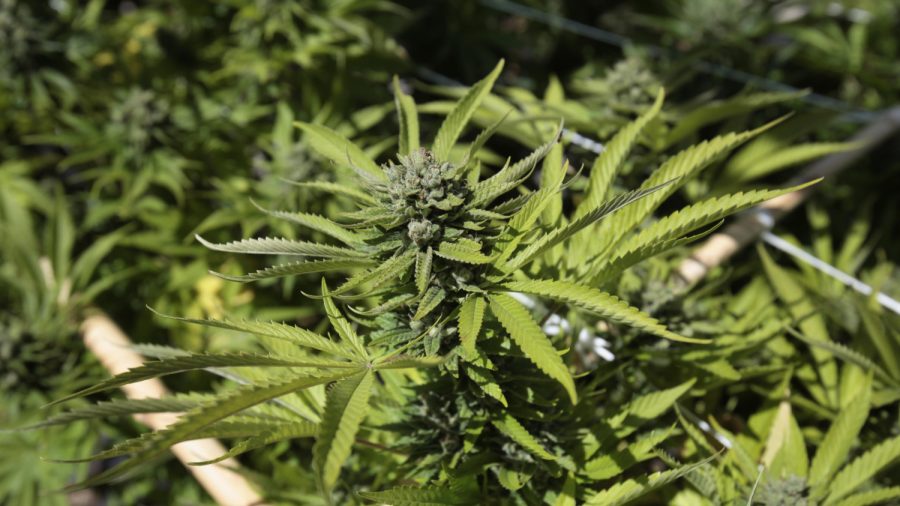Missouri and Maryland voters on Nov. 8 adopted ballot measures allowing adult-use marijuana, boosting the number of states where recreational weed is legal for those over 21.
Midterm voters in Arkansas, North Dakota, and South Dakota, meanwhile, rejected proposals to legalize recreational marijuana use by those 21-and-over, marking what is believed to be the first time such legalization measures were denied in statewide ballot referendums.
According to the National Conference of State Legislatures (NCSL), adult use of marijuana is now legal in 19 states. There are 37 states with legal medical marijuana programs, the NCSL documents.
New Hampshire became the 19th state to legalize marijuana when lawmakers adopted a 2022 bill allowing cannabis use by adults. With the Nov. 8 ballot measure votes on the books, Maryland and Missouri become the 20th and 21st states to do so.
There was never much doubt that Maryland’s legalization proposal, “Question 4,” placed on the ballot by state lawmakers, would pass; how Missouri’s proposed “Amendment 3” would fare was uncertain.
With 82 percent of 1.473 million ballots cast, 65.6 percent said “Yes” to Maryland’s “Question 4,” which states: “The possession and use of cannabis would become legal for people 21 and older starting in July 2023.”
When the law goes into effect on July 1 next year, the purchase and possession of up to 1.5 ounces of cannabis will be legal for adults 21 and older.
Under the measure, adults are allowed to grow up to two plants for personal use and can gift cannabis legally.
Missouri’s Constitutional “Amendment 3,” asking voters to say “yes” or “no” to the statement, “The possession and use of marijuana would become legal for people 21 and older,” was approved by 53.1 percent of more than 2 million ballots cast in the Nov. 8 vote.
The amendment cannot be implemented until Dec. 8. The soonest Missourians could purchase marijuana products recreationally is Feb. 6, 2023.
According to the amendment, recreational marijuana sales of will be taxed at 6 percent. Industry and state officials estimate Missouri’s recreational marijuana market will generate about $40.8 million in revenue annually.
Missouri’s new law allows adults to possess up to 3 ounces of cannabis and to cultivate up to six for personal use.
“Amendment 3” also creates a program to review and expunge criminal records for eligible non-violent marijuana-related offenses.
“Missourians have clearly demonstrated that support for ending prohibition isn’t relegated to the coasts or deep blue states, but that it is a common sense position that resonates with all Americans,” executive director of D.C.-based marijuana lobby group NORML, Erik Altieri, said in a statement.
“With the approval of Amendment 3,” he said, “Missouri voters rejected the failed ideas of the past and elected to chart a new path oriented on justice and sound public policy.”
Missouri NORML coordinator Dan Viets, who co-authored and chaired the Amendment 3 Advisory Board, called the measure’s adoption “truly a historic occasion.”
“This means that the great majority of the 20,000 people who have been arrested year after year in Missouri will no longer be subject to criminal prosecution for victimless marijuana law violations,” he said in a statement.
After approving medical marijuana in a 2016 state constitutional amendment, Arkansas voters rejected a Nov. 8 ballot measure seeking to make adult-use weed legal.
Arkansas’s “Issue 4” asked voters to reply “For” or “Against” the statement: “The possession and use of cannabis would become legal for people 21 and over, and the commercial sale of cannabis would be authorized.”
With 95 percent of 389,000 ballots cast, 56.3 percent said “Against” and 43.7 percent said “For.”
Opposition to “Issue 4” was spearheaded by the Arkansas Family Council Action Committee. Former Vice President Mike Pence campaigned in the state against the measure.
Both legalization proposals in North Dakota and South Dakota asked voters to answer “Yes” or “no” to the statement: “The possession and use of cannabis would become legal for people 21 and older.”
In North Dakota’s Measure 2 proposal, ’no’ votes tallied 55 percent of the 238,172 ballots cast.
In South Dakota’s Measure 27 proposal, ’no’ votes tallied 53 percent of the 347,397 ballots cast.
Proponents were stymied by popular South Dakota Gov. Kristi Noem appeared in campaign ads opposing legalizing marijuana.
“It’s not good for our kids. And it’s not going to improve our communities,” she said in one TV ad.
In Colorado, meanwhile, voters have approved a constitutional amendment that decriminalizes possession and use of psychedelic plants and fungi would be decriminalized for people 21 while mandating lawmakers adopt regulations for the distribution and administration of psychedelic substances.
Colorado’s Proposition 122 was approved in 51.2 percent of 1.9 million ballots cast, joining Oregon and a handful of cities as the only places where such substances are recreationally legal.
Earlier in 2022, as many as 15 marijuana legalization proposals across nine states were vying for the ballot, including as many as five in Arkansas.
Legalization ballot measures are planned for Mississippi in 2023 and two are collecting signatures for Wyoming’s 2024 ballot.
From The Epoch Times

